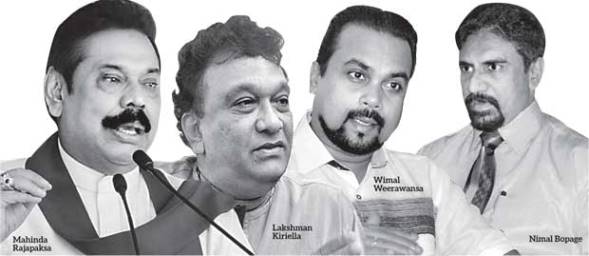Every Tom, Dick and Harry in this country wants to teach journalists a thing or two about how they ought to do their work. Those self-interested busybodies range from the bigwigs at the very top of the government to the Kachcheri clerks in the periphery and the NGO captains of civil society to the fishmongers at the Peliyagoda Fish market. Then there is a new breed of media educators, who have increasingly become disparaging towards us and want to share their received wisdom with the lowly scribes to guide us to the age of enlightenment.
All that is understandable; they are a reminder of our national obsession of interfering in other people’s businesses, because, we sincerely believe we know better than they do. So the doctors tell the government how to manage foreign trade and students tell policy makers how to regulate private universities and so forth.
However, the latest media missive by the media ministry secretary Nimal Bopage, who warned media of possible legal implications on the use of the term “ Joint Opposition” was a bit too much. Bopage was following that well-trodden path taken most recently by Minister Lakshman Kiriella and the Prime Minister himself, who thought the media were “going shopping” for the Rajapaksas . So that the media ministry secretary could have felt it was incumbent upon him to guide the wandering media souls on the path of righteousness. He probably wanted to score a few brownie points; instead, what happened was the exact opposite. He now looks like the court jester, who made a bad joke to the king.
The Media Minister has distanced the government from the ‘missive’ issued by the secretary to his ministry. The Prime Minister has summoned a meeting to discuss the matter. Bopage himself says the media release was his own initiative and that his intention was to build rapport with the media personnel.
He might have good intentions, but the way he acted on them has now landed him in the middle of a minefield. What most busybodies who think they know better than journalists about doing their job, do not understand is journalists everyday in their professional life navigate this minefield and write stories that sell newspapers. No one subsidizes the journalism industry, so that one has to sell the product. Most of that well-intentioned advocacy on good journalism fails in the selling department.
The controversy over his ‘missive’ may have been aggravated due to its political overtones. The Media Ministry secretary trying to dictate as to how the media should report the activities of 50 odd Members of Parliament loyal to MR is not just a matter of media freedom, but also does smack of a political bias, which by extension, allude to the politicization of his office.
The Joint Opposition of the MR acolytes may be a bunch of petty-minded, selfish individuals whose only interest is their own political survival, but that does not make it “unethical” as Bopage termed it, for media to cover the ‘Joint Opposition’, rather it would be ‘ unethical’ if the media chooses to suppress news on the ‘Joint Opposition’.
“The Prime Minister has summoned a meeting to discuss the matter. Bopage himself says the media release was his own initiative and that his intention was to build rapport with the media personnel”
And now by trying to expunge the Joint Opposition from media vocabulary, Bopage has given it a new lease of life. Wimal Weerawansa has finally found something to pick on. Media Ministry secretary has scored an own goal, that may be why the PM has summoned a meeting as means of damage control.
However, it will be near impossible to control this perennial habit of officials and politicians to ‘guide’ the media. Journalists will continue to be bombarded with unsolicited advices, like the one by Bopage. That is partly due to the central position that the media occupies in our everyday life.
Nor can the media deny it to be scrutinized by the public and the government, without compromising on freedom of expression and plurality of opinion, the very values that the media cherish. However, the journalists should be able to say, when needed, “thanks , but no thanks”. Being a journalist requires both humility and hubris in right quantities; and to be receptive and accommodative, but also be able to cut those self- important busybodies to the size.
This time around, however, the media has resoundingly told Nimal Bopage to mind his own business. Dictating how the newspapers term the Rajapaksa-cohort in parliament is surely not his business.
Follow Ranga Jayasuriya @RangaJayasuriya on Twitter
Courtesy – Daily Mirror
